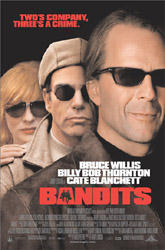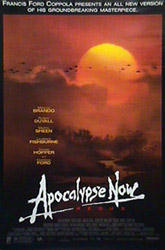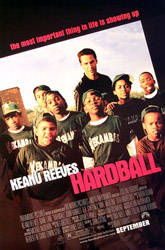Cinema-Scene.com
Volume 3, Number 40
This Week's Reviews: Bandits, Apocalypse Now Redux.
This Week's Omissions: Jackpot,
Joy Ride, Max Keeble's
Big Move, Soul Survivors,
Training Day.
Video Reviews: Hardball.
 |
Bandits

(Dir: Barry Levinson, Starring Bruce Willis, Billy
Bob Thornton, Cate Blanchett, Anthony Burch, Azura Skye, Stacey Miller, Bobby Slayton,
Brian F. O'Byrne, Troy Garity, Jaye K. Danford, Rocky LaRochelle, and January Jones)
more
BY: DAVID PERRY |
The always hit and miss Barry Levinson has another miss to
add with Bandits. Since the remarkable 1990-91 double threat of Avalon
and Bugsy, the Baltimore son has shown restraint (Disclosure), subtlety
(Liberty Heights), and genius (Wag the Dog), but only in the midst of
some horrendous films, including Sleepers, Jimmy Hollywood, Toys,
Sphere, and An Everlasting Piece. I still stand beside Levinson thinking
that there will be another gem to come out soon. Even if Bandits is not half the
film of Liberty Heights, I can guess that he surely won't make a third bad film
in a row.
This is not to say that Bandits is without any
redeeming features, just not enough to make it worth the effort. A couple nice
performances, an occasional laugh, and some nice cinematographic choices cannot save what
is essentially an uninteresting test of the audience's nerves. By the time the film
thankfully comes to an end, the audience has been through two hours of unrelenting
unevenness.
The people thanklessly bucking it out on the screen are
Bruce Willis and Billy Bob Thornton. Neither actor has really made a mark in films over
the last year. Each has shown some mediocre and destitute career moves, but their star
power shines unlike many others. When Sylvester Stallone and Arnold Schwarzenegger are
performing at a less-than-stellar respectability state, people ridicule them, but no
matter what these two men throw out at audiences -- Willis' underrated work in Unbreakable
notwithstanding -- they still hold some lumination.
The two actors play fictional bank robbers The Sleepover
Bandits, Terry (Thornton) and Joe (Willis). Terry is the neurotic one, constantly
wondering aloud if he has some illness or tumor bringing on his demise; Joe is the strong
one, taking control of the situation whenever in need. And he gets to take control at an
early point in the film, as he and Terry break out of their Oregon state penitentiary.
Within moments, Joe decides that a need for money means he must rob a bank -- Terry, of
course, tags along.
There is, however, something -- actually someone -- Joe
cannot control, a floozy redhead named Kate (Blanchett). Terry, en route to meeting Joe to
pull another heist, runs out of gas and turns up in Kate's car after she accidentally hits
him. She is willing to join them, though, since her husband is an uncaring creep -- and,
besides that, she learns that Joe shares an interest in cheesy 80's pop standards (her
first appearance is singing Bonnie Taylor's "I Need a Hero," and with Joe she
finds one). The authorities, of course, consider her to be a hostage and immediately up
the ante in catching The Sleepover Bandits, called that because they come to the bank
manager's home one evening and then go with them to rob the bank the next morning.
Harley Peyton's screenplay has the occasional moment of
genius, but it's so rare that it's easy to forget Peyton was one of the writers behind Twin
Peaks. Where that series was eerie and, at times, shocking in its anti-conformist
attitude, Bandits is simply unremarkable through a burdening reliance on said conformity.
Most every turn in the film feels forced from the opening of the film. In fact, within
moments of the credits, the film's twist ending becomes surprisingly easy to see. This is
not the only time that the movie feels poorly put together: plot holes and long moments of
disinterest cause any workable moments -- like a bar brawl between Terry and Joe -- to
feel like vignettes from another movie.
I know I'm going to sound like a broken record here, but I
cannot hold it back: the best thing in this film is Cate Blanchett. No, it's not her best
moment, but even in unworthy roles, Blanchett shows incredible quality in her performance.
I first saw her in Oscar and Lucinda four years ago and have sung her praises
ever since -- this is simply another notch on my "Hail Cate" poll. How many
actresses can say that they delivered eight great performances in just four years? Too
bad, Bandits has to be the least enjoyable movie outside of her performance.

BUY THIS FILM'S
  
FROM AMAZON.COM |
REVIEWS OF THIS FILM
   |
 |
Apocalypse Now 
(Dir: Francis Ford Coppola, Starring Martin Sheen,
Marlon Brando, Frederic Forrest, Albert Hall, Sam Bottoms, Laurence Fishburne, Robert
Duvall, Dennis Hopper, G.D. Spradlin, Harrison Ford, Jerry Zeismer, Scott Glenn, and Bo
Byers)
more
BY: DAVID PERRY |
[Portions of this review were also used in David
Perry's repertory review of Apocalypse Now, published 26 January 2001]
One of the finest novels I ever read in high school was
Joseph Conrad's Heart of Darkness. Its poignant story with a backdrop filled with
more symbolism than a normal human can comprehend was just what enough to quench my thirst
for flawless storytelling on the printed page. And, like most any novel I have ever read,
I read it after seeing its film version -- I was a huge fan of Francis Ford Coppola's Apocalypse
Now, a Vietnam parallel to Conrad's novel, long before ever turning the first page.
What made the two stories, which are different in as many
ways as they are alike, so profound was that both stood so well on their own. Apocalypse
was just as incredible after reading the novel and the novel was just as mind-blowing
knowing what happened from the film. The genius of both Conrad and Coppola is found in
each work, arguably the best of their respective careers (I happen to be a Godfather
devotee, but I can see how some would consider Apocalypse Now to be better).
Where Conrad's Marlowe heads up the Congo River as an
appointed captain of a ship en route to meet a highly respected chief named Kurtz who's
treated as a god by his African lackeys, Coppola's Willard (Sheen) heads up the Nung River
as an appointed assassin of a mission en route to kill a highly respected colonel named
Kurtz (Brando) who's treated as a god by his Cambodian lackeys. Much of what happens to
the lead character of Marlowe is Vietnamized for the screen, making an overzealous general
manager into an overzealous bombing lieutenant (Academy Award nominated Duvall), an
introspective Russian trader under the thumb of Kurtz into an introspective American
photojournalist (Hopper) under the thumb of Kurtz.
Coppola brings the story to the screen in a fashion that is
more fitting than a straight adaptation. Like F. Scott Fitzgerald's The Great Gatsby,
so much of the story is in its literary mood, something that is incredibly hard to capture
on celluloid. Turning the story into something that nearly every American knows, the film
becomes more than simply a loose adaptation, retaining the aspects of Conrad's novel while
being completely respectable on its own.
Apocalypse Now is still the story of a man
journeying into an oblivion of darkness, not knowing exactly how threatening it can get,
but also about the Vietnam War, and the way violence took over the hearts of people that
had never held a gun before. There are characters so baby-faced in this film that it is
harrowing to watch them shoot the guns that kill fellow beings. There's Lance (Bottoms), a
famous surfer that cowers and screams when violence is at hand and there's 17-year old
Miller (a 14-year old Fishburne) who holds a machine gun called 'Canned Heat' like it is a
play toy.
The year before Apocalypse Now was released,
America had just seen the war between two Vietnam films, which would go head-to-head at
the Academy Awards a mere three months before Apocalypse Now was released at the
Cannes Film Festival (where it shared the Palme d'Or with The Tin Drum).
Nevertheless, Apocalypse Now took a role that was not fulfilled by either The
Deer Hunter or Coming Home. Where those two films looked at what happened to
Vietnam veterans when they made the journey back to the states, Apocalypse Now is
about what they went through while still fighting.
Apocalypse Now was nominated for 8 Academy Awards,
but only won two (for the incredible work of cinematographer Vittorio Storaro and sound
designers Richard Beggs, Mark Berger, Nathan Boxer, and Walter Murch), losing Best Picture
and Best Director to Annie Hall. Perhaps it was too soon to look back at the Hell
in Vietnam, for today, no one would ever question which of the two films is better.
It would be seven years before the Vietnam War was dealt
with in such an adult manner with Oliver Stone's tour de force Platoon. For the
early part of the eighties, films changed and the grand masters of the seventies (Coppola,
Martin Scorsese, and Robert Altman) had to change with the times -- only two of them
(Scorsese and Altman) still retain the respect they had back then. Today, people deal with
harrowing stories of war like they are riding a carousel. If Roland Emmerich's The
Patriot had just come closer to realism than patriotism, it might have been a grand
achievement. Some might say that today's war will be nothing like Vietnam -- with the
youth of America dying on the field of some distant land. Technology is better, and
weapons are more strategic than a flank of a thousand landing on a Viet-Cong village.
With the release of Apocalypse Now Redux, for all
intensive purposes "the director's cut," fans of the monumental original can
finally see some of the most talked about deleted scenes in film history. The fleshed out
Brando rants, the Playboy Bunny escape, and the hugely famous French plantation sequence
(previously only seen as an excerpt in Hearts of Darkness: A Filmmaker's Apocalypse)
create an atmosphere missing in the original release.
But there is a trade of attributes by bringing in these
scenes -- the film, which was already slow and thoughtful, lasts an additional 50 minutes.
Now Apocalypse Now is barely short of three and a half hours and after a while,
those extra minutes are felt. People seeing this as their initiation to Coppola's vision
will probably be turned off by the extensive length -- even those having already seen the
movie will feel a little pushed by it. However, these already enlightened will enjoy the
chance to see these new scenes. Well, that and the fact that the underlying effect of the
film remains untarnished.
Looking over my old Apocalypse Now repertory
review in today's climate -- with America in war again -- it seems extremely weird. In my
original review I wrote:
"Francis Ford Coppola's film reminds us of why we
never want that again. For all the war hawks in the world, it is tough to feel good about
Vietnam after seeing it recreated on celluloid in films like Apocalypse Now, Platoon,
and Stanley Kubrick's Full Metal Jacket. Today, even having never served one
moment in the trenches or in the swamps of some warring country, we have seen the darkness
that eats the souls of mortal men and left them grasping for that one piece of humanity
left."
Present day America is a nation almost completely in
agreement over war. More than a month ago, people could not even imagine going to war --
our last complete committal to military action was two generations ago -- now those same
people are calling for it. Apocalypse Now was made to show how a man can change
over time -- in that paradoxical sense, the tragedy on 11 September showed how a nation
can change in an instant.

BUY THIS FILM'S
  
FROM AMAZON.COM |
REVIEWS OF THIS FILM
   |
Video Review: Various connections
have made it a little easier for me to get my hands on various films that I skipped
earlier in the year. For that reason, beginning this week, I'll review some of the
movies that I did not see in the weeks that have passed. This week: Hardball.
 |
Hardball

(Dir: Brian Robbins, Starring Keanu Reeves, Diane
Lane, John Hawkes, D.B. Sweeney, Trevor Morgan, Michael B. Jordan, DeWayne Warren,
Reginald McKinley, Brian Reed, Julian Griffith, Graham Beckel, Alan Ellis, Jr., Carol
Hall, Jacqueline Williams, Kristopher Lofton, Michael Perkins, Freeman Coffey, Bryan
Hearne, and Mike McGlone)
more
BY: DAVID PERRY |
Remember the Walter Matthau/Tatum O'Neil relationship found
in The Bad News Bears? Remember the way these two perfectly balances each other,
cuteness to gruffness, happy to mad? Well, entering Hardball, the latest rewrite
of The Bad News Bears formula, you might think this same relationship would be
ahead of you. But you would be mistaken -- Hardball lacks anything that could be
compared. The closest thing to a collision between Keanu Reeves and one of his players is
when a small one cannot understand why he did not get a jersey. It's enough human bonding
to make Ingmar Bergman cry.
Keanu, everyone's favorite schlep in cinematic rebound,
plays Conor O'Neill, a down-on-his-luck gambler kicking his time around Chicago running
from loan sharks and bookies. When he loses another $6,000 (automatically bringing to mind
the classic Al Pacino line from Glengarry Glen Ross: "You just cost me
$6,000. Six thousand dollars!"), Conor turns to his longtime friend, an investment
banker, for the cash. He doesn't get the money, but instead a job offer -- he can earn
$500 a week if he'll coach the investment firm's inner-city softball team.
Conor, in his desperation, takes the job and soon finds
himself in the midst of pre-teens who take every chance they have to curse the other
players, each other, and him. This is not the Mighty Ducks, more like the Ugly Ducklings.
And each one falls into a cliché: the player who's too young, the player who's too old,
the player who's too sick, the player who's too belligerent, and the player who's too
quirky.
Every facet of the story has been etched in stone long
before this film went into production. Screenwriter John Gatins used the Automated
Screenplay Writer© earlier this year in Romantic Comedy Mode
for Summer Catch, and now he turns to it Uplifting Family Film Mode for Hardball.
Evidently, he actually read over the draft when it was done this time -- I doubt that the
Uplifting Family Film Mode allows the use of profanity. Doesn't really matter, though, he
didn't fix the glaring mistakes in the script when he skimmed over it.
Now, I don't want to get too critical of the film's early
moments because I was not necessarily disturbed by them. Three-quarters into the film, I
was ready to give it an innocuous C-, but a huge turn in the finale quarter plummets the
film's standings. For about 90 minutes, Hardball was a forgettable little mistake, but in
the end, it breaks a law of sentimentality comparable to the blunder found in the climax
of Pay It Forward (for sake of people fearful of spoilers, I will not explain).
Not only is the story arc disturbingly damning, but it is also a horrible excuse to usher
in some uplifting monologues from Keanu Reeves, an actor who has not been known for his
verbal techniques.
In his defense, though, Keanu seems to give a better effort
than the character really deserves. One critic, I believe Stephen Holden in The New York
Times, wrote of the way he gives a sullen youth to the character. Reeves, himself seeming
like a child awaiting adulthood, plays the roll with a gusto rarely seen from the actor.
He pulled off menacing in The Gift late last year and now he pulls off leaden in Hardball.
Keanu Reeves has not been an actor to count on -- as was proven by Little Buddha,
Johnny Mnemonic, The Watcher, and a rogues gallery of other mistakes.
But he does always seem to try, and I think effort really counts -- especially when the
film is so listlessly bad.
Taking in the wannabe realism found in some of the latest
releases in Hollywood only makes me appreciate the true realists out there. Éva Gárdos' An
American Rhapsody, Terry Zwigoff's Ghost World, Léa Pool's Lost and
Delirious, Scott McGehee and David Siegel's The Deep End, and Larry Clark's Bully.
While some of those films veer onto the surreal, they all show emotional touches that are
ten times more realistic than anything found in John Madden's Captain Corelli's
Mandolin, Pat O'Connor's Sweet November, Scott Hicks' Hearts in Atlantis,
and Brian Robbins' Hardball. All of those films try desperately to tap into the
human soul and spirit and almost all fail miserably (and, looking over them, each a
failure in their own genre -- though, I should say that Hearts in Atlantis rises
above its mistakes at times).
Hardball, with its cutesy kids saying the darndest
things makes for lowbrow humor that never really works. Sure the kids get to utter
expletives for laughs, but who really thinks that is funny? It's like that treacle-like
line from Hearts in Atlantis where Anthony Hopkins notes that kids always like
fart jokes -- for some unknown reason, some people like kids saying expletive jokes.
Though, no one, unless an adamant Steel Magnolias fan or a sadist, will rally
behind the ending regardless of kids saying profanity.

BUY THIS FILM'S
  
FROM AMAZON.COM |
REVIEWS OF THIS FILM
   |
Reviews by:
David Perry
©2001, Cinema-Scene.com
http://www.cinema-scene.com





